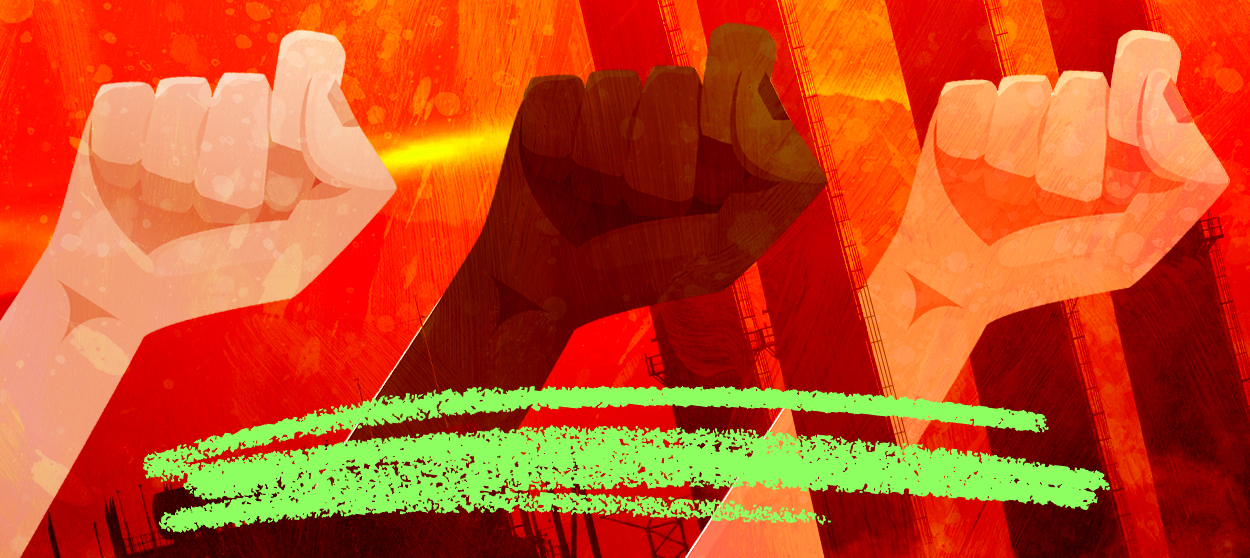The long-overdue rise of climate radicalism
Finally people are injecting some energy into climate politics with mass civil disobedience


A free daily email with the biggest news stories of the day – and the best features from TheWeek.com
You are now subscribed
Your newsletter sign-up was successful
Last Friday, people on every continent on Earth participated in one of the biggest coordinated protest marches in history — some 4 million people marched from Berlin to New York to even Antarctica. On Monday the disruptions continued, with multiple people arrested in Washington D.C. for blocking traffic as part of a climate protest. And next month, Extinction Rebellion, the U.K.-based group which was responsible for major demonstrations in London earlier this year, is planning another huge protest.
It's an extremely heartening demonstration of the rise of a new generation of climate radicals — young people all over the planet, like Sweden's Greta Thunberg, who are attempting to force political systems around the world to stop dithering and tackle the biggest problem facing human society.
An important background to these protests is the fact that even at this late date, the worst of climate change could still be avoided. The technical obstacles are real but surmountable — indeed, the pace of technological advancement (and associated price decreases) for renewable technologies of all kinds have consistently outpaced expert predictions. It would take a gigantic effort to avert catastrophe, but it could be done.
The Week
Escape your echo chamber. Get the facts behind the news, plus analysis from multiple perspectives.

Sign up for The Week's Free Newsletters
From our morning news briefing to a weekly Good News Newsletter, get the best of The Week delivered directly to your inbox.
From our morning news briefing to a weekly Good News Newsletter, get the best of The Week delivered directly to your inbox.
Now, the major obstacle to climate action is a threefold political problem: first, the massively profitable vested interests in carbon fuels and all the associated downstream users of that energy; second, the worldwide climate denial movement (heavily funded in turn by Big Carbon); and third, the lack of willpower from political moderates.
One peculiar aspect of this new climate radicalism compared to previous radical movements is that, on its face at least, it does not demand for a wholesale restructuring of society. Thunberg and company do not demand new constitutional structures, or collective ownership of the means of production, or anything similar — but only that existing major parties live up to their expressed commitment to head off climate change. (The U.S. Republican Party is the only major party in any big country that denies the science outright.)
Of course, the hour is so late that any sufficient climate justice plan would necessarily have gigantic economic ramifications — above all the wholesale deletion of all property rights in buried carbon reserves, which would constitute the greatest expropriation of wealth since the emancipation of the slaves. But it's still possible to imagine a society which is largely similar to today's, only with low-carbon sources of power. Why hasn't this happened?
The money and thus political power of Big Carbon are definitely part of why little progress has been made. It was people like the Koch brothers who made climate denial an article of faith on the American right.
A free daily email with the biggest news stories of the day – and the best features from TheWeek.com
However, supposedly "reality-based" liberals have been little better than reactionaries on climate. The danger of climate change has been understood well for over 30 years. The sensible, moderate thing to do would have been to crack down on carbon pollution in, say, 1990, when the changes could have been relatively slow. And yet even by 2008, a moderate liberal president took almost his entire term to do anything significant on climate, and in the meantime enabled a gigantic expansion of oil and gas drilling that made the U.S. the biggest producer of carbon energy in the world.
Political moderates almost never display this kind of foresight implied by their supposed ideology. Instead they tend to just instinctively defend the status quo, and get extremely fussy about people who disrupt things in the service of political protest — particularly if they are personally inconvenienced. Writing from jail, Martin Luther King, Jr. railed against the "white moderate" who is "more devoted to 'order' than to justice; who prefers a negative peace which is the absence of tension to a positive peace which is the presence of justice; who constantly says: 'I agree with you in the goal you seek, but I cannot agree with your methods of direct action[.]'"
If climate change is to be confronted, the people seriously worried about it need to be inspired to blast forth a volcano of political energy, and people who pretend to be concerned but don't really care need to be shaken to their core. As Fredrick Douglass once wrote, "For it is not light that is needed, but fire; it is not the gentle shower, but thunder. We need the storm, the whirlwind, and the earthquake. The feeling of the nation must be quickened; the conscience of the nation must be roused; the propriety of the nation must be startled; the hypocrisy of the nation must be exposed; and its crimes against God and man must be proclaimed and denounced."
And that will no doubt make some people uncomfortable, like the D.C. drivers who were late getting to work on Monday. To them I say — sorry pals, should have done something about this 30 years ago. Now is the time of fury.
Want more essential commentary and analysis like this delivered straight to your inbox? Sign up for The Week's "Today's best articles" newsletter here.
Ryan Cooper is a national correspondent at TheWeek.com. His work has appeared in the Washington Monthly, The New Republic, and the Washington Post.
